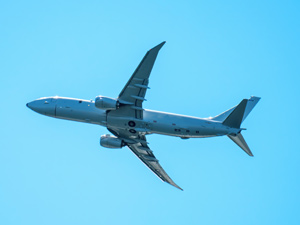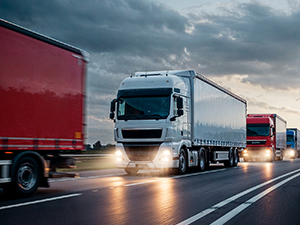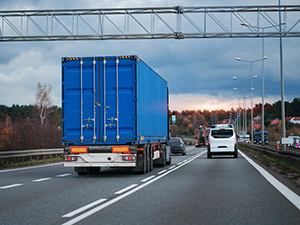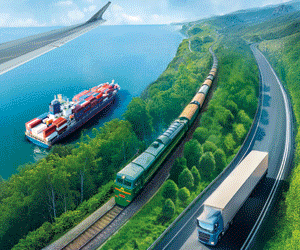Key to Air Cargo Resilience Post Pandemic: Industry Cooperation, Safety, Sustainability and Modernization
The International Air Transport Association (IATA) urged the air cargo industry to continue working together at the same pace, with the same levels of cooperation as during the COVID-19 pandemic to overcome future challenges and build industry resilience.

12 Ekim 2021 Salı 18:29
Sustainability, modernization, and safety were highlighted as key priorities for the industry post pandemic. The call was made at the 14th World Cargo Symposium (WCS), which opened in Dublin today.
“Air cargo is a critically important industry. This pandemic reminded us of that. During the crisis, it has been a lifeline for society, delivering critical medical supplies and vaccines across the globe and keeping international supply chains open. And for many airlines, cargo became a vital source of revenue when passenger flights were grounded. In 2020, the air cargo industry generated $129 billion, which represented approximately a third of airlines’ overall revenues, an increase of 10–15% compared to pre-crisis levels. Looking towards the future, the outlook is strong. We need to maintain the momentum established during the crisis and continue building resilience post pandemic,” said Brendan Sullivan, IATA’s Global Head of Cargo.
Outlook for Air Cargo
The outlook for air cargo in the short and long-term is strong. Indicators such as inventory levels and manufacturing output are favorable, world trade is forecast to grow at 9.5% this year and 5.6% in 2022, e-commerce continues to grow at a double-digit rate, and demand for high-value specialized cargo – such as temperature-sensitive healthcare goods and vaccines - is rising.
This year cargo demand is expected to exceed pre-crisis (2019) levels by 8% and revenues are expected to rise to a record $175 billion, with yields expected to grow by 15%. In 2022 demand is expected to exceed pre-crisis (2019) levels by 13% with revenues expected to rise to $169 billion although there will be an 8% decline in yields.
“The surge in demand for air cargo and attractive yields are not without complications. Pandemic restrictions have led to severe global supply-chain congestion and created hardships for aircrew crossing international borders. Resourcing and capacity, handling and facility space and logistics will be an issue. This will create further operational challenges for our industry that must be planned for now. But we have demonstrated resilience throughout the crisis and with that same focus we will overcome these challenges,” said Sullivan.
Sustainability
“Sustainability is our industry’s license to grow. Shippers are becoming more environmentally conscious and are being held accountable for their emissions by their customers. Many are now reporting how much their supply chains produce in emissions, and they are looking for carbon-neutral transportation options. We all need to meet customer expectations for the highest standards of sustainability. The path from stabilizing to reducing net emissions will require a collective effort,” said Sullivan.
At IATA’s Annual General Meeting last week, airlines committed to achieve net-zero carbon emissions by 2050. This commitment will align with the Paris Agreement goal for global warming not to exceed 1.5°C. The strategy is to abate as much CO2 as possible from in-sector solutions such as sustainable aviation fuels, new aircraft technology, more efficient operations and infrastructure, and the development of new zero-emissions energy sources such as electric and hydrogen power. Any emissions that cannot be eliminated at source will be eliminated through out-of-sector options such as carbon capture and storage and credible offsetting schemes.
Modernization
“The pandemic accelerated digitalization in some areas as contactless processes were introduced to reduce the risk from COVID-19 transmission. We need to build on this momentum not only to drive improvements in operational efficiency but to meet the needs of our customers. The biggest growth areas are in cross-border e-commerce and special handling items like time and temperature sensitive payloads. Customers for these products want to know where their items are, and in what condition, at any time during their transport. That requires digitalization and data,” said Sullivan.
IATA highlighted three major projects moving the industry towards digitalization and the progress being made in each:
- E-air waybill is at 75% now and is expected to achieve 100% by the end of 2022.
- IATA’s ONE Record vision, enabling the whole supply chain to work together off one standardized and exchangeable set of data has 17 pilots in progress involving 145 companies and 3 customs authorities.
- IATA’s Cargo XML messaging standards are being accepted by an increasing number of customs authorities.
“E-air waybill, ONE Record and Cargo XML are big industry projects. And they are moving us in the right direction. So that is good. But we need to continue working at the same pace as we did during the COVID-19 crisis,” said Sullivan.
Safety
Safety was highlighted as a priority for the industry, specifically the transport of lithium batteries.
“Demand for lithium batteries continues to rise as does the risk from lithium battery related fires. Our main concern has been around accidents from rogue shippers who – miss-declare shipments. But the incident on the ramp at Hong Kong International Airport earlier this year reminded us just how big the challenge is. The investigation indicated that loading and handling was as per regulation and the consignment was declared correctly,” said Sullivan.
IATA called for:
- Regulatory authorities (EASA and FAA) to accelerate development of a test standard that can be used to demonstrate that fire containment pallet covers and fire-resistant containers are capable of withstanding a fire involving lithium batteries.
- Government authorities to step up and take responsibility for stopping rogue producers and exporters of lithium batteries.
- Industry to step up and expand the collection of incident data and develop methods for the data to be shared to support the airlines’ safety risk assessment processes.
Trade Facilitation
“Frictions have increased across the world. And there are big political problems such as protectionism and vaccine inequality that will need time to resolve. But we have agreed treaties that need ratification, like the World Trade Organization’s Trade Facilitation Agreement (TFA) which focuses on business and trade. Despite the political tensions we encourage countries to make good on their agreements,” said Sullivan.
As of today, 154 countries have ratified the agreement – 94% of WTO membership. Governments yet to ratify the TFA are urged to do so, and signatory countries should implement it as soon as possible. The cost of inaction is high. Full implementation could boost global trade by $1 trillion per year, reducing global trade costs by an average of 14%.
![Almark Logistics Rusya ve Belarus Hatlarında Denizyolu Taşımalarını Güçlendirdi]() Almark Logistics Rusya ve Belarus Hatlarında Denizyolu Taşımalarını GüçlendirdiAlmark Logistics, Rusya ve Belarus’a yönelik denizyolu taşımalarında önemli bir büyüme kaydetti. Şirket, kırk beşlik konteyner kullanımının yaygınlaşmasıyla operasyonel verimliliğini artırırken, müşterilerine maliyet ve rekabet avantajı sundu.28 Ocak 2026 Çarşamba 16:08Lojistik
Almark Logistics Rusya ve Belarus Hatlarında Denizyolu Taşımalarını GüçlendirdiAlmark Logistics, Rusya ve Belarus’a yönelik denizyolu taşımalarında önemli bir büyüme kaydetti. Şirket, kırk beşlik konteyner kullanımının yaygınlaşmasıyla operasyonel verimliliğini artırırken, müşterilerine maliyet ve rekabet avantajı sundu.28 Ocak 2026 Çarşamba 16:08Lojistik![Schengen Vize Kısıtları Taşımacılığı Zorluyor]() Schengen Vize Kısıtları Taşımacılığı ZorluyorUND, profesyonel sürücülere yönelik Schengen vize ve kalış süresi uygulamalarının lojistik akışları olumsuz etkilediğini belirterek, Sırbistan ve Balkan ülkelerindeki taşımacılarla yürütülen ortak eylemlere destek verdiğini açıkladı.28 Ocak 2026 Çarşamba 15:38Lojistik
Schengen Vize Kısıtları Taşımacılığı ZorluyorUND, profesyonel sürücülere yönelik Schengen vize ve kalış süresi uygulamalarının lojistik akışları olumsuz etkilediğini belirterek, Sırbistan ve Balkan ülkelerindeki taşımacılarla yürütülen ortak eylemlere destek verdiğini açıkladı.28 Ocak 2026 Çarşamba 15:38Lojistik![Dennis Eagle Allison xFE™ Şanzımanlarla Verimliliği Artırıyor]() Dennis Eagle Allison xFE™ Şanzımanlarla Verimliliği ArtırıyorBirleşik Krallık’ın önde gelen atık toplama araç (RCV) üreticisi Dennis Eagle, iki ve üç akslı Dennis Eagle Elite+ şasilerinde Allison Transmission tarafından geliştirilen xFE™ tam otomatik şanzımanları tercih ediyor.28 Ocak 2026 Çarşamba 15:09Ticari Araçlar
Dennis Eagle Allison xFE™ Şanzımanlarla Verimliliği ArtırıyorBirleşik Krallık’ın önde gelen atık toplama araç (RCV) üreticisi Dennis Eagle, iki ve üç akslı Dennis Eagle Elite+ şasilerinde Allison Transmission tarafından geliştirilen xFE™ tam otomatik şanzımanları tercih ediyor.28 Ocak 2026 Çarşamba 15:09Ticari Araçlar![Avrupa Orta Asya Ticaretinde Türkiye Lojistik Köprü Oluyor]() Avrupa Orta Asya Ticaretinde Türkiye Lojistik Köprü OluyorAvrupa Birliği’nin Orta Asya açılımında Türk taşımacılarının kritik rolüne dikkat çekiliyor.28 Ocak 2026 Çarşamba 14:35Lojistik
Avrupa Orta Asya Ticaretinde Türkiye Lojistik Köprü OluyorAvrupa Birliği’nin Orta Asya açılımında Türk taşımacılarının kritik rolüne dikkat çekiliyor.28 Ocak 2026 Çarşamba 14:35Lojistik![Renault Trucks ve Hugelshofer Elektrikli Kamyon Potansiyelini Ortaya Koyuyor]() Renault Trucks ve Hugelshofer Elektrikli Kamyon Potansiyelini Ortaya KoyuyorRenault Trucks ve Hugelshofer iş birliğiyle elektrikli kamyonlar, doğru operasyon ve şarj stratejisiyle yoğun taşımacılık koşullarında yüksek performans sergiliyor.28 Ocak 2026 Çarşamba 14:00Ticari Araçlar
Renault Trucks ve Hugelshofer Elektrikli Kamyon Potansiyelini Ortaya KoyuyorRenault Trucks ve Hugelshofer iş birliğiyle elektrikli kamyonlar, doğru operasyon ve şarj stratejisiyle yoğun taşımacılık koşullarında yüksek performans sergiliyor.28 Ocak 2026 Çarşamba 14:00Ticari Araçlar![Solmaz’dan Gümrük Süreçlerine Dijital Yaklaşım]() Solmaz’dan Gümrük Süreçlerine Dijital YaklaşımSolmaz, Beyond Customs platformu ile gümrük operasyonlarını tek bir dijital yapı altında toplamayı hedefliyor.27 Ocak 2026 Salı 16:19Lojistik
Solmaz’dan Gümrük Süreçlerine Dijital YaklaşımSolmaz, Beyond Customs platformu ile gümrük operasyonlarını tek bir dijital yapı altında toplamayı hedefliyor.27 Ocak 2026 Salı 16:19Lojistik![Schengen Güzergahında Protesto: Sırbistan Sınırlarında Yük Geçişleri Aksayabilir]() Schengen Güzergahında Protesto: Sırbistan Sınırlarında Yük Geçişleri AksayabilirSchengen uygulamalarına yönelik protestolar nedeniyle, Sırbistan’ın Schengen bağlantılı sınır kapılarında yük taşımacılığında gecikmeler yaşanabileceği bildirildi.27 Ocak 2026 Salı 16:05Lojistik
Schengen Güzergahında Protesto: Sırbistan Sınırlarında Yük Geçişleri AksayabilirSchengen uygulamalarına yönelik protestolar nedeniyle, Sırbistan’ın Schengen bağlantılı sınır kapılarında yük taşımacılığında gecikmeler yaşanabileceği bildirildi.27 Ocak 2026 Salı 16:05Lojistik![Mercedes-Benz Türk 2026 Model Otobüslerini Tanıttı]() Mercedes-Benz Türk 2026 Model Otobüslerini TanıttıMercedes-Benz Türk, 2026 model yılıyla birlikte Travego, Tourismo ve Conecto otobüslerinde güvenlik, konfor ve verimliliğe yönelik 36 yenilik sunuyor.27 Ocak 2026 Salı 15:40Ticari Araçlar
Mercedes-Benz Türk 2026 Model Otobüslerini TanıttıMercedes-Benz Türk, 2026 model yılıyla birlikte Travego, Tourismo ve Conecto otobüslerinde güvenlik, konfor ve verimliliğe yönelik 36 yenilik sunuyor.27 Ocak 2026 Salı 15:40Ticari Araçlar![Tea & Talk 2025; SGS TransitNet Genel Müdürü Mine Kaya]() Tea & Talk 2025; SGS TransitNet Genel Müdürü Mine KayaUluslararası logitrans Transport Lojistik Fuarı etkinlikleri kapsamında Aysberg Basın Yayın organizatörlüğünde gerçekleşen Tea & Talk 2025 söyleşilerinin konuğu SGS TransitNet Genel Müdürü Mine Kaya oldu.26 Ocak 2026 Pazartesi 14:41Lojistik
Tea & Talk 2025; SGS TransitNet Genel Müdürü Mine KayaUluslararası logitrans Transport Lojistik Fuarı etkinlikleri kapsamında Aysberg Basın Yayın organizatörlüğünde gerçekleşen Tea & Talk 2025 söyleşilerinin konuğu SGS TransitNet Genel Müdürü Mine Kaya oldu.26 Ocak 2026 Pazartesi 14:41Lojistik![Volvo Trucks Euro NCAP Güvenlik Testlerinden Tam Not Aldı]() Volvo Trucks Euro NCAP Güvenlik Testlerinden Tam Not AldıVolvo Trucks, Euro NCAP’in ağır vasıtalar için yaptığı güvenlik değerlendirmesinde en yüksek puan olan 5 yıldızı üçüncü defa kazandı.23 Ocak 2026 Cuma 16:07Ticari Araçlar
Volvo Trucks Euro NCAP Güvenlik Testlerinden Tam Not AldıVolvo Trucks, Euro NCAP’in ağır vasıtalar için yaptığı güvenlik değerlendirmesinde en yüksek puan olan 5 yıldızı üçüncü defa kazandı.23 Ocak 2026 Cuma 16:07Ticari Araçlar
- Geri
- Ana Sayfa
- Normal Görünüm
- © 2025 Kargo Haber


















Türkçe karakter kullanılmayan ve büyük harflerle yazılmış yorumlar onaylanmamaktadır.